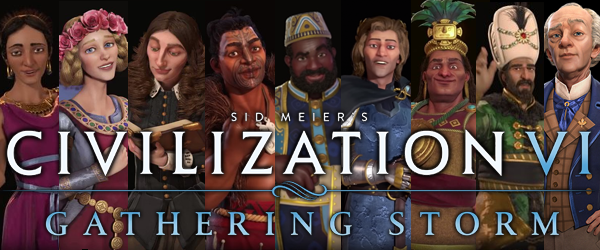
Civilization VI's second expansion, Gathering Storm recently released and has added a handful of new civilizations and leaders. I am hoping to write a strategy for each of them, but I want to start with the civilizations and leaders who are completely new to the franchise. This time, I'll be writing about one of the more interesting of the new civs and leaders: the Māori, lead by Kupe the Navigator.
Natives of the Polynesian Triangle are some of the most successful sea-faring peoples in the history of the world. Between 1400 BC and 900 BC, they had begun sailing large ocean-going craft called "waka", that enabled them to cross from Taiwan, through the Philipines, and out to the Melanesian and Samoan islands. Over the next two thousand years, they managed to colonize Pacific islands as far as Hawai'i, Easter Island, and New Zealand. Some historians even believe that they made it as far as the coast of South America! Sometime in the 13th or 14th century, settlers from Polynesia sailed west, began colonizing New Zealand, conquered the local tribes, and began to culturally diverge from their Polynesian ancestors to become the Māori.
According to legend, the first Polynesian to arrive in New Zealand is Kupe the Navigator, chief of Hawaiki. Kupe is figure in Māori mythology, but like Gilgamesh, Hiawatha, and others, he is believed to be an actual historic figure. Historians have constructed accounts of Kupe's life that differ from the various oral legends of the Maori and Polynesian peoples. According to legends, Kupe sailed from Hawaiki (the mythological birthplace of the Polynesian people), along with great migration fleets, to colonize New Zealand as far back as antiquity, battling sea demons along the way. According to historians, Kupe probably found New Zealand between 750 AD and 925 AD after his cousin drowned on a fishing trip and Kupe fled across the sea with his cousin's kidnapped wife, only to return to Hawaiki later to convince others to migrate to the newly-discovered lands with him.
DISCLAIMER:
Civilization VI is still a "living game". Strategies for the game (and for specific leaders and civs) may change as Firaxis applies balance patches, introduces new features, or expands the game through further DLC or expansion packs, or as the Civ community discovers new strategies or exploits. As such, the following strategy guide may change from time to time. I will try to keep it up-to-date, and will make notations whenever changes are made. I'll also post links in the official 2K forums and CivFanatics, where I'll also report any changes made. If possible and practical, I will try to retain the original content of the strategy for posterity.
I welcome any feedback or suggestions that readers wish to offer. Feel free to post on the linked forums, or by posting a comment at the bottom of the page.
This guide is up to date as of the release of the Gathering Storm expansion's "Great Works and Trade Update" (April 2019) (ver. 1.0.0.317)
Māori are a sea-faring and environmentalist-focused civilization. They can embark and sail across ocean from the beginning of the game, and they get extra yield from unimproved feature tiles.
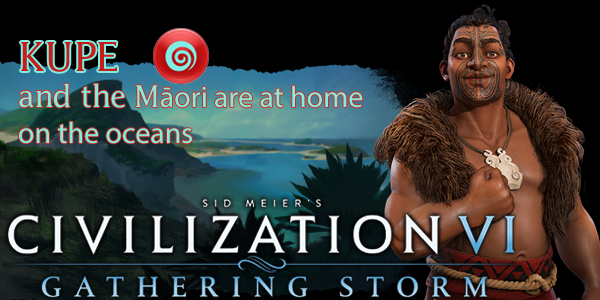
Kupe of Māori's uniques in Civilization VI

Māori capital start bias: literally in the middle of the ocean.
Māori civilization unique: Mana
"Begin the game with the Sailing and Shipbuilding technologies unlocked and with the ability to enter Ocean tiles. Embarked units gain +2 Movement. Unimproved Woods and Rainforest are +1 Production, becoming +2 once the Conservation civic is unlocked. Fishing Boats provide +1 Food and a Culture Bomb to adjacent tiles. Resources cannot be harvested. Great Writers cannot be earned."
The Māori specialize in building productive cities without necessarily needing to chop or harvest. In fact, you explicitly cannot harvest any resource! This might not seem like that big of a deal, until you realize that this also prevents you from placing districts or wonders on tiles that are known to contain resources. This can be a real pain if you find (for example) a tile nestled between some mountains and surrounded by rainforest, which would be an ideal spot for a Campus, but the tile in question has bananas on it.
You are allowed to chop woods and rainforest, but you are encouraged not to by the fact that unimproved forests provide additional production. The idea is to make these forests worth keeping around instead of chopping them for instant production. Granted, the hundreds of production you'll earn from each forest (on standard game speed) is far more than the 50 or so you'll get from chopping it; however, production now is almost always better than production later! Chopping a forest to rush a district, building, or wonder means you can start receiving the benefits of that district, building, or wonder sooner. In the case of wonders, chopping will also help ensure that you finish the wonder before someone else, so that the production you did invest isn't in vain. That chop production can be further buffed if you combine it with policies that improve the production rate towards the thing you're building.
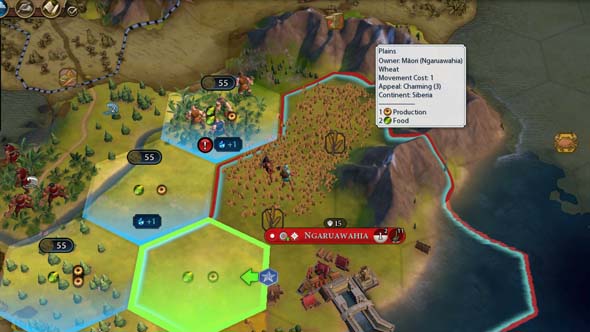
I cannot build a Campus near the mountains because I can't remove the Wheat resource.
If you do chop your woods early, you'll be able to re-plant them later in the game to receive all of the Māori's forest buffs.
Fishing Boats also provide additional food, helping Māori coastal cities to grow large and productive. Fishing boats will also provide a culture bomb that can claim adjacent tiles or steal them from another player or city state. The culture bomb can only claim tiles that are within 3 tiles of a Māori city. You cannot use the culture bomb to push your borders out beyond range 3 of a city. You also cannot steal a tile containing another player's completed district or wonder. You can, however, steal tiles that contain a district or wonder that is still under construction, which forces the other player to abandon that construction and can stall them from finishing the district or wonder.
Kupe's leader unique: Kupe's Voyage
"Starts the game in an Ocean tile. Gain a free Builder and +1 Population when settling your first city. The Palace receives +3 Housing an d+1 Amenity. +2 Science and +2 Culture per turn before you settle your first city."
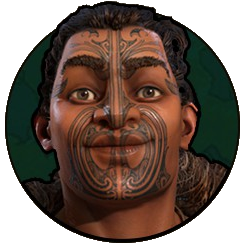
Kupe may be the second most unique leader in the game, after the "I can't found my own religion or compete for religious victory" Mvemba a Nzinga of Kongo; though neither is quite as game-changing as "I can't train Settlers" Venice of Civilization V. Kupe begins the game with a Settler and Warrior embarked in the middle of the ocean, with no land in sight in any direction. You will have to sail around with your Warrior and Settler in order to find land and a suitable location for your capital city.
Once you found that capital city, you'll be given a head start of a free Builder and an extra point of population. The Palace also grants extra housing and amenity to help your capital city grow faster and larger.
In the meantime, you'll receive +2 science and +2 culture per turn before settling that capital city. This will prevent you from falling too far behind on the tech and civic trees right out of the gate.
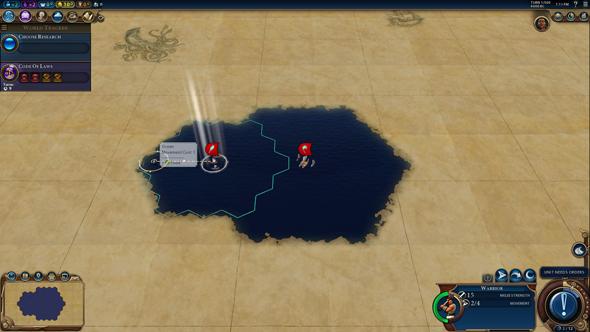
Kupe starts out in the ocean, with no land in sight!
NOTE: Māori's start bias (in the ocean) seems to be a factor of the map-generation script -- not of the civilization / leader! This means that if you play using a modded map script, the Maori may not start in the middle of the ocean. They will spawn in a normal, un-biased starting location, just like every other civ.
Unique building: Marae
Game Info:
"A building unique to the Māori. +1 Culture and Faith to all of this city's tiles with a passable feature or natural wonder. After Flight is researched receive +1 Tourism to all of this city's tiles with a feature or natural wonder. Costs no maintenance. Has no Great Work slots."
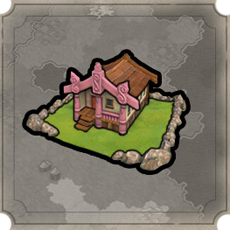
Requirements: Drama and Poetry civic,
must be built in a Theater Square.
Replaces: Amphitheater.
Cost: 150 Production / 600 Gold [Standard speed].
Maintenance Cost: none.
Effects: +1 culture and faith to all of this city's tiles with a passable feature.
+1 tourism to all of this city's tiles with a feature (after researching Flight).
No great work slots. No Great Writer points.
The Marae is a unique building within the Theater Square district. It does not have any inherent effects. Instead, it provides culture and faith (and tourism after flight) to all of the city's tiles that have a passable feature. This includes woods, rainforests, floodplains, marshes, oases, reefs, geothermal fissues, volcanic soil, and passable natural wonders. It does not include mountains, hills, volcanoes, or impassable natural wonder tiles. Cities without any of these features will not benefit from the Marae, even though it is still a prerequisite for other culture buildings in the city. It costs no maintenance, but you'll still have to spend the production to build the Marae in order to unlock more advanced Theater Square buildings such as Museums and Broadcast Towers.

Unique unit: Toa
Game Info: "Māori Classical era melee unit. Adjacent enemy units receive -5 Combat Strength. Can build a Pā."
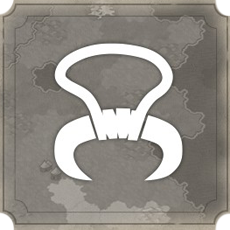
Requirements: Construction technology
Replaces: Swordsman.
Obsoleted: Gunpowder.
Upgrades to: Musketman.
Cost: 120 Production / 480 Gold [Standard speed].
Maintenance Cost: none.
Attack Type: Ranged, Promotion Class: melee,
Melee Strength: 36,
Movement Speed: 2.
Bonuses: Reduces combat strength of adjacent enemy units by 5,
+10 combat strength versus anti-cavalry units,
Has one build charge, and can construct the Pā.
Toa is a unique sword replacement that does not require iron or have any ongoing maintenance cost. It might also be available slightly earlier than a Swordsman, depending on your tech path. It has the same base strength as a Swordsman, but costs 30 % more to train. However, it has the effect of reducing the combat strength of any adjacent enemy unit by 5, and receives an additional +10 strength against anti-cav units (Spears, Pikes, etc.). This combination brings the strength of Pikemen down to 36 to match the Toa, but then gives the Toa an additional +10 against that pike. This makes the Toa a dominant melee unit on maps in which iron is absent or highly limited -- at least until Coursers, Muskets, or Pike & Shot start showing up.
If iron is prevalent, and your opponent is able to build Knights, or if your opponent has a lot of ranged units, then the Toa becomes much less potent.
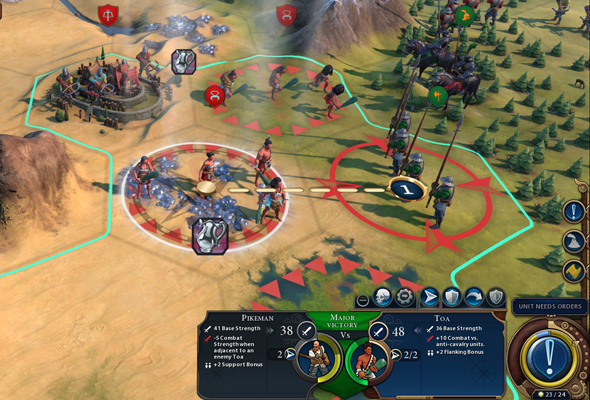
Toa will dominate Swords, Pikes, and Horsemen.
The Toa only has a single build charge. If you want to build a Pā on a forested tile, you should not use the Toa to clear the forest, since you won't have a charge left to actually build the Pā. Bring a Builder to clear the forest. Since the Toa has a build charge, it is also able to repair pillaged improvements. As long as you don't spend their build charge, you can use Toa's to repair improvements that were pillaged by a disaster, or to repair pillaged improvements after capturing or defending a city.
Unique improvement: Pā

Game Info: "Unlocks the Toa ability to construct a Pā, unique to Māori.
Occupying unit receives +4 Defense Strength, and automatically gains 2 turns of fortification. A Māori unit occupying a Pā heals even if they just moved or attacked. Must be build on a Hill tile."
Requirements: Must be built by Toa. Can only be built on Hill without any features.
Effects: +4 Defense Strength to occupying unit,
Occupying unit automatically gains 2 turns of fortification. Māori unit occupying Pā automatically heal.
The Māori Pā is identical to a Fort, except that it is available much earlier, and it automatically heals an occupying Māori unit (even if that unit moved, attacked, or took another action that turn).
Other civs (except Rome) would normally have to wait until the Siege Tactics technology to start building Forts, and must also build Encampment districts in order to train Military Engineers. Instead, the Māori only need to research Construction and train a unique Toa unit. The Pā can only be built on a featureless hills (no forest), so make sure you bring a Builder along to clear any forest on the tile. You'll also get the defensive bonus of being on a hill if you station a unit within the Pā.
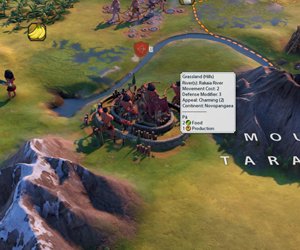
Pā can fortify choke points outside of your borders.
The Pā can make for a great look-out outpost for your borders. Unlike an Encampment, you can eventually tear down the Pā to replace it with a mine, or another improvement or district as your territory expands. However, the Pā does not get the ranged strike or extra walled defense that the Encampment would receive.
You can also build a Pā outside of your borders. This can give you a forward operating base from which to stage an invasion, or it could allow you to fortify a position while you wait for a Settler to arrive. You can also use the Pā to fortify choke points outside of your borders in order to slow down or stop a land-locked enemy long before they reach your borders or threaten your cities. If you're forced to retreat, you can pillage the Pā to prevent the enemy from using it.
Playing as Kupe's Māori: steward of nature
Kupe has to work a little bit in order to find a suitable starting location. Your embarked Warrior and Settler will usually need to spend a turn or two sailing through the ocean before finding land. I recommend sailing in an outward spiral to increase the odds of finding nearby land. Your starting Settler will be very vulnerable while you're scouting for a place to plant your first city. There shouldn't be much in the way of barbarian naval units, but once you make landfall, be sure that you keep an escort with you -- just in case.
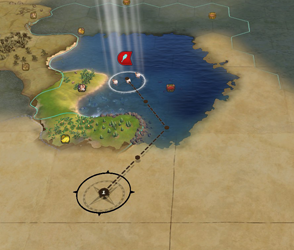
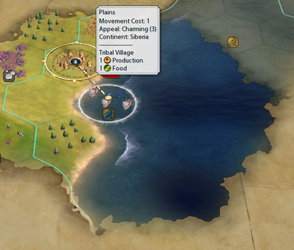
Explore while embarked. You'll cover more ... um ...ground? Only make landfall to visit Tribal Villages.
I recommend keeping your explorers embarked, except if you need to make landfall to claim a tribal village. Your embarked speed is much faster than you walking speed on land, and exploring while embarked will cover much more ... um ... ground?
Once you do find land, you don't necessarily want to settle in the first place you see. You should spend at least a couple more turns sailing around the coastline to find a place that has lots of resources, fresh water, woods to work/chop, and [very importantly] lots of natural features. You'll get some automatic culture and science, so you won't fall as far behind by spending extra time to find the perfect spot to settle. Once you do settle, you'll receive a free Builder and extra point of population, so you also won't fall behind in terms of production either.
Having to find a place to settle your first city may push you right up against city states or rival civs. This will be especially true on Emperor difficulty and above, in which the A.I.s will start with an extra Settler and will be able to found a second city on turn 2 or 3. If you settle next to a city state, you should consider quickly conquering it before they build walls. If you're pressed up against the borders of another civ, then keep an eye on the loyalty of your cities and watch out for religious pressure. You'll probably also be asked to promise not to settle near them, which can be a source of free Diplomatic Favor early in the game. You can easily keep this promise by settling across the water.
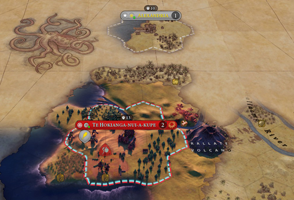
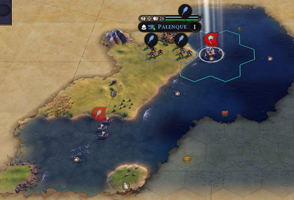
You may end up settling very near to city states or other civs.
Start out by settling in the more competitive spots near other civs in order to give yourself a buffer between any potential rivals. Then, explore for isolated islands or landmasses full of only city states. Use the Colonization civic, combined with Magnus' Provision promotion (don't lose population when training Settler) and the Ancestral Hall government building (discount to Settlers and free Builder when founding a city), to spam settlers and colonize those islands and isolated landmasses that you found before other civs research Cartography and start settling there themselves.
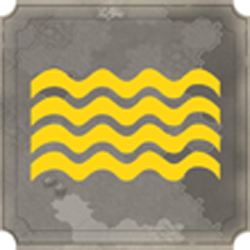
Since your empire may be spread out over multiple islands or landmasses, you'll almost definitely need to build an early navy in order to protect your Traders, Settlers, and Builders from barbarians and rivals as they travel between islands. Adopt Maritime Industry early in the game, and pump out several Galleys and Quadremes. These should hold you over until the renaissance. The ability to cross ocean means that you can always retreat onto ocean (where your opponents cannot follow) if naval battles aren't going your way. The Lisbon city state's suzerain bonus will make your Traders immune to being plundered when embarked. With Lisbon, you won't have to manually escort your Traders, which will significantly reduce the amount of micro-management that you'll have to do with your navy.
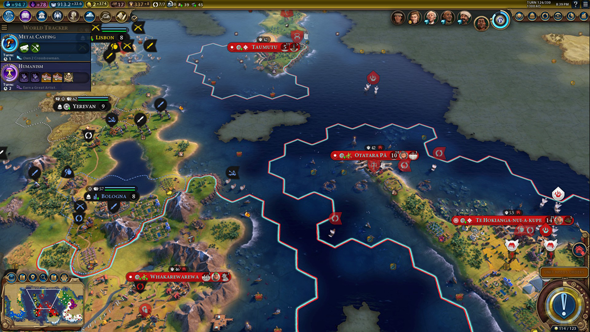
Your empire may be spread across multiple islands or landmasses, with embarked Traders travelling in between.
The value of governors is also dramatically different for the Māori. Magnus is substantially nerfed by the inability to harvest resources, but he still can be useful if you want to chop forests. Reyna is substantially buffed by the Māori's bonus towards unimproved woods / rainforest, due to her Forestry Management promotion that grants +2 Gold to every woods / rainforest tile in the city. Every wood / rainforest tile in a city with Reyna will net +1 production (from Mana ability) and +2 gold (from Reyna's Forestry Management)! It may be worthwhile to keep these forests around unless you need them for chop-rushing a wonder or particularly valuable district.
Buffs towards forests don't end there. If you settled near lots of features (which you definitely should be doing), you should put priority on getting your Theater Squares out ASAP so that you can build the Marae. The benefits of the Marae will stack with Mana and governor Reyna's Forestry Management to provide +1 production, +2 gold, +1 culture, and +1 faith on all unimproved woods / rainforest tiles, on top of the base yield and any bonus yield from resources such as bananas, deer, dyes, silk, gems, and so forth. You'll get all this extra yield without even needing to train Builders!
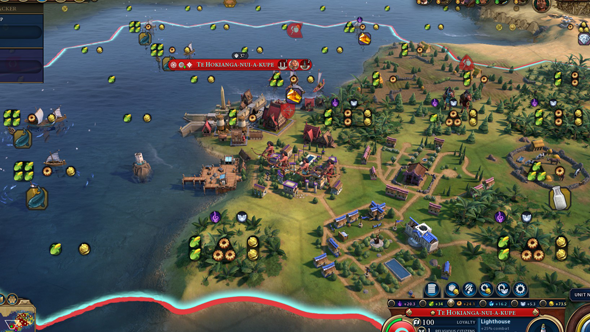
Marae and Reyna with the Forestry Management promotion will make a very high-yield city --
no improvements necessary!.
In the case of luxury resources, you will still need to train a Builder to improve the tile in order to connect the luxury and receive its amenities. However, the improvement does not destroy the underlying forest, so you'll remove the +1 production from Mana and the +2 gold from Reyna, but you'll keep the culture and faith from the Marae.
The Marae will also buff other tiles besides woods / rainforest. All passable features will be buffed with +1 culture and faith. Geothermal fissues will be particularly valuable, since they'll provide a little bit of everything, including clean electricity if you improve them with a Geothermal Plant after researching Synthetic Materials.
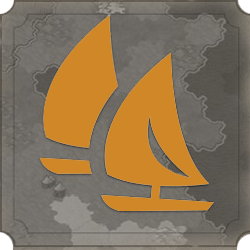
God of the Sea (+1 Production from fishing boats) should be an obvious candidate for a pantheon, and Auckland's suzerain bonus (if you find them in the game) will complement this pantheon very well by providing an additional +1 Production on all shallow ocean tiles (whether they have resources or not). Since you'll be less likely to chop rainforest, you might also want to give a second look to Sacred Path pantheon -- but only if you plan on building Holy Sites adjacent to rainforests.
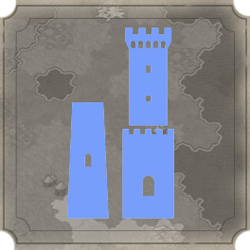
The Māori's unique penalties will also make some city states more of a mixed bag. Bologna, for example, provides +1 great person point towards Writers, Artists, and Musicians. Since Māori cannot create Writers, this city state's ability could be considered to be 33% weaker. However, the inability to recruit Writers will mean that other great works will be more valuable to Māori -- if you're trying to compete in culture and tourism. The +1 Artist and Musician points will help slightly to get more of them out faster to offset the lack of writing. It might also be worthwhile to suzerain Bologna (or conquer them) in order to deny this bonus to other culture-oriented civs.
Seek and destroy
Being able to cross ocean from the start of the game puts Māori in the unique position of being able to target any civ for conquest from the start of the game. You aren't limited to just conquering the rivals on your starting continent. This means that you can look for other civs who are likely to become military powerhouses, and target them for military conquest (or world policing) before they can start to runaway with their home continent. Look for leaders like Alexander of Macedon, Montezuma of Aztec, Shaka of Zulu, Genghis Khan of Mongolia, Tomyris of Scythia, and Amanitore of Nubia, and be sure to keep them in check.
Also look out for naval-focused civs like England, Norway, and Phoenicia. Keep a close eye on them, and work to keep them in check, as they may [eventually] pose a threat to your island colonies.
Inversely, if a runaway civ is on the same continent as you, you can also sail across an ocean to find weaker civs or city states to pick on first. Just don't leave yourself vulnerable to the neighboring runaway.
Similarly, if you're playing a religious game, you can send your Missionaries and Apostles across the oceans to proselytize. Use Missionaries to convert a city or two on every landmass, and use Apostles to defeat any rival Missionaries that try to convert those cities, and to decrease rival religious pressure.

Being able to sail across ocean and meet all the other civs early also means that you'll have extra influence in the World Congress. You'll be able to vote on virtually every proposal and emergency that comes up! This means that you should definitely work to maintain a large reserve of Diplomatic Favor, so that you can control the World Congress and use it to your advantage. Emergencies, in particular, can be a good way of earning some early Diplomatic Victory points. You gain extra favor from alliances, city state suzerains, and governments, and the world wonder Országház will double the favor you earn from city state suzerains.
Since your unique unit does not require Iron, you can sell excess Iron early in the game in exchange for gold, luxuries, or Diplomatic Favor. Keep enough iron to build and maintain some Knights, but sell all the rest. Having priority access to isolated land masses will also hopefully give you access to more luxuries, which you can also sell for gold or Diplomatic Favor.
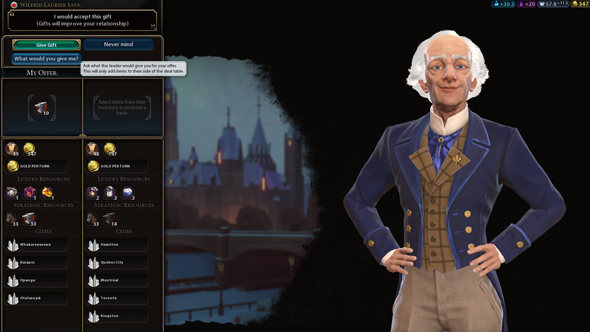
Sell your iron for gold and/or Diplomatic Favor.
This favor can be useful when the World Congress comes up. Being that many of your cities will likely be along the coast, you'll be disproportionately affected by rising sea levels from global warming. To delay the effects of rising sea levels, you should vote to ban the construction of new Industrial Hub buildings whenever the Urban Development Treaty comes up for vote. Since you should be getting a large amount of production from forests, you will be less reliant on Industrial Hubs, Factories, and Power Plants. Passing this treaty before other civs have been able to industrialize will slow them down without necessarily affecting you as much.
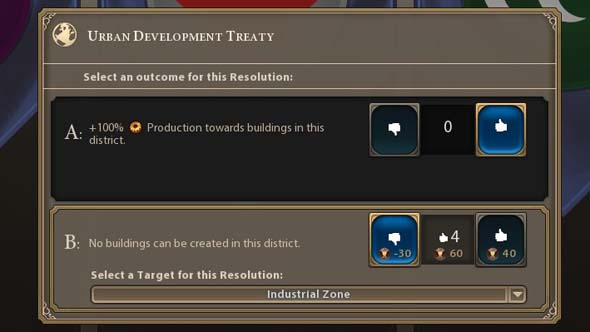
Ban other players from building Factories and Power Plants via the Urban Development Treaty in World Congress.
From my experience, the Māori don't have affinity towards any specific victory condition(s). They are fairly versatile.
Playing against Kupe's Māori
Kupe's A.I. agenda: Kaitiakitanga
"Retains natural features in their empire and builds National Parks. Likes civs who respect the environment; dislikes civs who treat the planet poorly."
Kupe the Navigator is the biggest environmentalist in the game. He will dislike you for harvesting resources, chopping forests, and especially for polluting the atmosphere with CO2 and contributing to global warming. If you keep your forests intact, avoid harvesting resources, and build some National Parks, then Kupe will probably be your best friend in the game. If you rely on a chop economy, then you should probably resign yourself to being in conflict with Kupe throughout the game. I'm not sure how much you have to chop or harvest before he will start to hate you. This may depend on the game length and map size, but I'm not sure. Kupe will likely be angry if you heavily industrialize, which makes sense since his cities (being mostly coastal) will be disproportionately affected by rising sea levels if he isn't able to tech to Computers and build Flood Barriers early enough.
You also may find yourself in conflict with Kupe due to him forward-settling. He doesn't get a reserved start location of his own, and will often be pushed right up against at least one other player. The ability to cross oceans also means he'll be very likely to spread his cities out onto multiple land masses. Don't be surprised to suddenly (and unexpectedly) find a Māori city on your coast -- especially if it's next to a natural wonder like the Great Barrier Reef, Galapogos Islands, Cliffs of Dover, or Lysefjord.
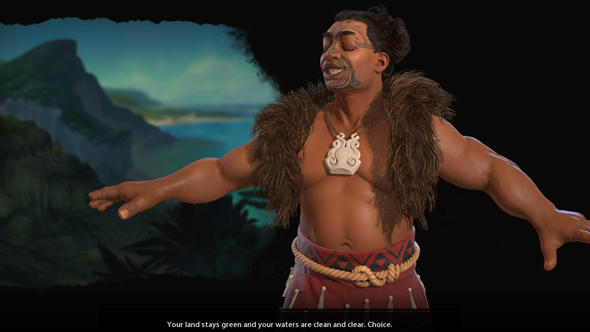
Kupe is the biggest environmentalist in the game, and will be happy if you're not chopping, harvesting, or polluting.
An A.I. Kupe is liable to spread himself too thin, placing cities where they will lose loyalty pressure and easily flip. If he places a city near where you wanted to place a city, you can likely use a Golden Age, Bread and Circuses project, and governors to apply pressure and flip his cities without military conflict. If it does come down to military conflict, then you may be able to get the jump on Kupe before he can sail his army to defend a distant colony.
A human-controlled Kupe will probably do a much better job of settling cities where they can remain loyal, and defending them with a viable navy and embarked ground army. Expect a human player to keep his overseas empires more compact. If a human player does reach to settle a distant city, expect him or her to settle multiple cities (along with a governor or two) on a new continent so that they can reinforce each other with loyalty.
Kupe will be a slow start with regard to tourism due to his inability to recruit Great Writers and the lack of slots in which to place literature. However, he can still turn it around through the use of National Parks and Seaside Resorts (assuming his coasts aren't flooded by rising sea levels). Otherwise, watch out for him to aggressively expand on multiple continents, especially during the medieval period when his Toa are cheap and resource-free. Don't get complacent if you're on an island or continent without other military threats. Kupe could show up out of nowhere -- at any time -- and punish you for your lack of foresight.
Discussions & Change Log
Thanks for reading. I hope this guide helps you to build a Māori civilization that will boldly go where no pre-Cartography civilization has gone before, and which will stand the test of time!

These strategy guides for Civilization VI have been taking longer to research and write than I would like. Part of this is due to the fact that I'm not as familiar and experienced with Civ VI as I was with Civ V when I started writing strategy guides for that game, so I have to spend more time trying to learn the different mechanics and rules associated with each new civ that I play. I also have a lot more things competing for my time.
If you enjoy this strategy guide, and would like to see more like it, please consider making a contribution and become a Patron on Patreon. As a Patron, you'll have the ability to vote on which civilization(s) you'd like to see a strategy guide for next, will receive early previews of certain content, and will have an opportunity to discuss or contribute to its development. With some additional funding, I could dedicate more time to writing guides like this one, and can maybe even branch out into more video content on Youtube.
In any case, feel free to comment and share, or discuss you Māori strategies in the CivFanatics forums at:
https://forums.civfanatics.com/threads/
a-general-strategy-for-kupes-maori.646499/
or on the official 2K forums:
https://forums.2k.com/showthread.php?
4369464-A-general-strategy-for-Kupe-s-Maori
[Show Change Log] [Hide Change Log]
20 June 2019:
Based on feedback from user Victoria in the Civfanatics forums, added a note that Toa can repair pillaged improvements.